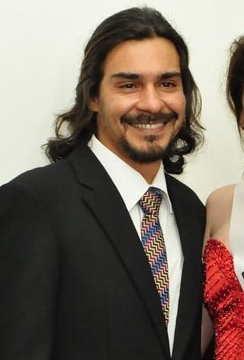
D&D Adventurers League is the organized play association for the Dungeons & Dragons (D&D) roleplaying game which is officially administered by D&D's publisher, Wizards of the Coast. It was rebranded with the launch of D&D's 5th Edition in 2014. Prior to 2014, it was known as the Role Playing Game Association Network. The organization was originally established by D&D's previous publisher, TSR, Inc., in 1980.
The Museum of the Portuguese Language is an interactive Portuguese language—and Linguistics/Language Development in general—museum in São Paulo, Brazil. It is housed in the Estação da Luz railway station, in the urban district of the same name. Three hundred thousand passengers arrive and leave the station every day, and the choice of the building for the launching of the museum is connected to the fact that it was mainly here that thousands of non-Portuguese speaking immigrants arriving from Europe and Asia into São Paulo via the Port of Santos got acquainted with the language for the first time. The idea of a museum-monument to the language was conceived by the São Paulo Secretary of Culture in conjunction with the Roberto Marinho Foundation, at a cost of around 37 million reais.
Lionel's Kingdom is a Brazilian comic strip created in 1961 and part of the Monica's Gang comic strips.

Television in Brazil has grown significantly since the first broadcasts in 1950, becoming one of largest and most productive commercial television systems in the world. Its biggest network, TV Globo, is the largest commercial network in South America, and is one of the major television exporter globally, particularly of telenovelas, having become popular in many countries. There are more than 90 free-to-air television networks, as well as satellite channels broadcasting throughout the country.

Cléber Américo da Conceição, known as just Cléber, is a Brazilian former footballer who played as a defender.

The history of ethanol fuel in Brazil dates from the 1970s and relates to Brazil's sugarcane-based ethanol fuel program, which allowed the country to become the world's second largest producer of ethanol, and the world's largest exporter. Several important political and technological developments led Brazil to become the world leader in the sustainable use of bioethanol, and a policy model for other developing countries in the tropical zone of Latin America, the Caribbean, and Africa. Government policies and technological advances also allowed the country to achieve a landmark in ethanol consumption, when ethanol retail sales surpassed 50% market share of the gasoline-powered vehicle fleet in early 2008. This level of ethanol fuel consumption had only been reached in Brazil once before, at the peak of the Pró-Álcool Program near the end of the 1980s.

The 2009 swine flu pandemic spread to Brazil on April 25, 2009, with two people, spreading to 34 over the first two weeks. CDC calculate that Africa and Southeast Asia, which have 38% of the world's population, accounted for a disproportionate 51% of the deaths.
The Federal University of Sergipe is a Brazilian public institution based in Sergipe, with campuses in São Cristóvão, Aracaju, Itabaiana, Laranjeiras, and Lagarto. Founded in 1967 by the junction of the state's existing colleges, it became its second university and its first public one. It became the state's most reputable and competitive higher education institution, ranking among the country's 40 best universities and Latin America's top 200 list.
A Muralha is a Brazilian telenovela that first aired on TV Excelsior in 1968. It is based on the 1954 novel by Diná Silveira de Queirós.

Leandra Rodrigues Leal Braz e Silva is a Brazilian actress, singer, film director, producer, and playwright.

The Brazilian Volleyball Super League is the top level Brazilian professional volleyball competition. It is organized by the Brazilian Volleyball Confederation. It shares the same name as the men's tournament, and are disputed simultaneously. The number of participating clubs varies every year. The champion team qualifies for the South American Championship.

Deborah Sochaczewski Evelyn is a Brazilian actress.

Lília Cabral Bertolli Figueiredo is a Brazilian actress. She has already been nominated twice to the International Emmy Award for Best Actress, for her roles as Marta in Pages of Life (2006–2007) and as Tereza in Seize the Day (2009–2010).

Alessandra Vidal de Negreiros Negrini is a Brazilian actress. She is known for her roles in Brazilian telenovelas and films. She began her television career after starring in Olho no Olho (1993) playing the role of Clara. In film, her first role was Lília in the Four Days in September movie. This opened up gates for her as she has starred in over a dozen telenovelas and in television series since then. In telenovelas she is known for her roles in Desejos de Mulher (2002), Paraíso Tropical (2007), Lado a Lado (2012), Boogie Oogie (2014).

Nathalia Timberg is a Brazilian actress. She is celebrated as one of the best and most well known Brazilian actresses of cinema, theater and television.

Rosa Maria Pereira Murtinho, known professionally as Rosamaria Murtinho, is a Brazilian actress.
João Emanuel Carneiro Silva, also known by his initials JEC, is a screenwriter, film director, and author of Brazilian telenovelas. His many works include: Central Station, Midnight, Orfeu, and Castelo Rá-Tim-Bum.

Sérgio Britto was a Brazilian actor and film director. He appeared in more than forty films from 1951 to 2008.
Mauro Mendonça is a Brazilian actor. Born in Ubá, he started his career in 1955 in the Teatro Brasileiro de Comédia. He debuted in the 1963 TV Excelsior telenovela Corações em Conflito. He went on to act on Rede Record and TV Tupi before moving to Rede Globo in 1973, where he continues to practice acting.

André Gonçalves is a Brazilian actor.












